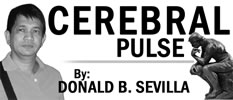VOLUME XXIX No. 17 |
Tagbilaran City, Bohol, Philippines |
Spetember 21, 2014 issue |
advertisement |
| - |
| - |
ARCHIVED ISSUES |
 |
 |
VoxPopuliVox Dei |
|
In the olden times people assembled at the Agora or town square to speak out their voices. They engaged in debate and discussion on issues that affected them. They spoke and argued and agreed on matters of importance. Such assemblies gave birth to the Republic espoused by the philosopher Plato and laid the foundations for modern democracy. In a democratic form of governance, the concerns of the majority prevail over a few in stark contrast to an autocratic or authoritarian rule where power is concentrated in a few or worse, one entity. Participation by many is encouraged and fostered. And like the assemblies at the Agora but on a larger scale, we hold elections for the people to decide on their choice of leaders. The votes of the majority are seen as voices representing the true will of the people. Untainted, free and without coercion these voices echo the people's mandate. Thus it can be said that a freely elected leader reflects the people's choice. But in our modern society men resort to clever ways of capturing and even thwarting the people's sentiments in these electoral exercises. We swoon voters by persuasion and open campaigning, coercion by intimidation and even bribery by vote buying. Allegations of fraud and cheating are not uncommon as these are often hotly contested. The whole process is complex and has gone a long way from the simple cries of approval or disapproval in ancient times at the town square. We resort to lengthy protests which often remain unresolved until the next political exercise. Contending parties fight tooth and nail to earn the people's votes, destroying each other through black propaganda and character assassinations. It becomes a lengthy, expensive and sometimes violent undertaking. Whichever way it is conducted, only when the people choose by their own free will and volition can we say that they echo the voice of God. Similarly in matters concerning governance, our leaders should listen and heed the people's voices. They were chosen and given mandate by the people to lead and serve the interests of the majority. Decisions should be made in consideration of the greater good and in consensus with the general sentiments of the governed. Leaders should not be deaf and numb to the people's plight. Public clamor should be heard and addressed for looking after the public welfare is a hallmark of exemplary leadership. The right to govern is a sacred trust that should be dispensed with care and compassion. All successful leaders in history are well-loved by their people. They steered their nations to greater heights and etched their names for generations to remember and honor. They practiced service above self and adhered to the laws of the land with respect. They showed impartiality living a life of modesty and incorruptibility. By keeping true to their mandate, heeding their people's voices, they stood as models for others to follow. |
| - |
| - |
The Bohol Sunday Post, copyright 2006 - 2014, All Rights Reserved |
For comments & sugestions please email: webmaster@discoverbohol.com |



